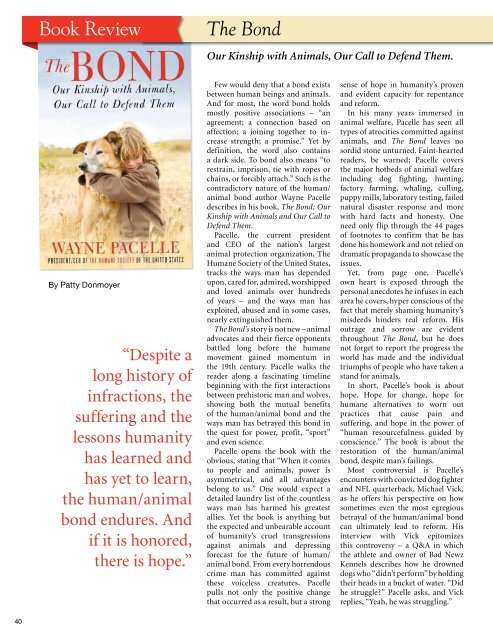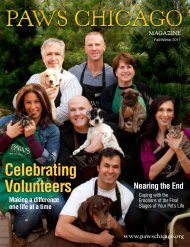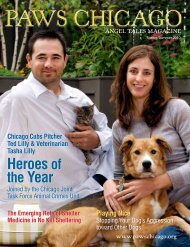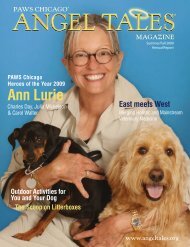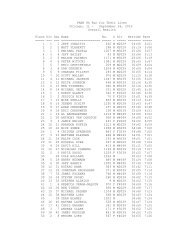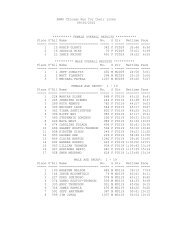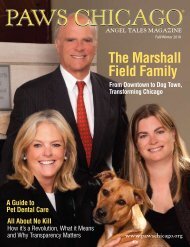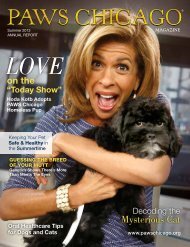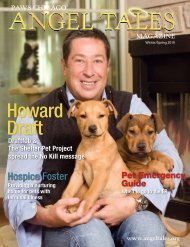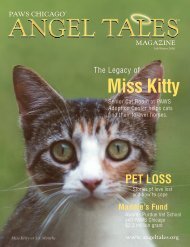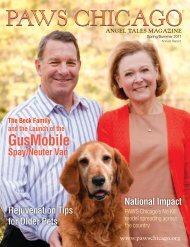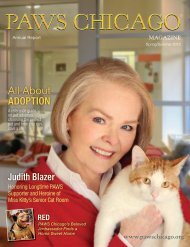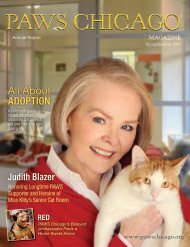DAVID DUFFIELD - PAWS Chicago
DAVID DUFFIELD - PAWS Chicago
DAVID DUFFIELD - PAWS Chicago
Create successful ePaper yourself
Turn your PDF publications into a flip-book with our unique Google optimized e-Paper software.
Book Review<br />
The Bond<br />
by Wayne Pacelle<br />
Book Review<br />
By Patty Donmoyer<br />
“Despite a<br />
long history of<br />
infractions, the<br />
suffering and the<br />
lessons humanity<br />
has learned and<br />
has yet to learn,<br />
the human/animal<br />
bond endures. And<br />
if it is honored,<br />
there is hope.”<br />
Our Kinship with Animals, Our Call to Defend Them.<br />
Few would deny that a bond exists<br />
between human beings and animals.<br />
And for most, the word bond holds<br />
mostly positive associations – “an<br />
agreement; a connection based on<br />
affection; a joining together to increase<br />
strength; a promise.” Yet by<br />
definition, the word also contains<br />
a dark side. To bond also means “to<br />
restrain, imprison, tie with ropes or<br />
chains, or forcibly attach.” Such is the<br />
contradictory nature of the human/<br />
animal bond author Wayne Pacelle<br />
describes in his book, The Bond; Our<br />
Kinship with Animals and Our Call to<br />
Defend Them.<br />
Pacelle, the current president<br />
and CEO of the nation’s largest<br />
animal protection organization, The<br />
Humane Society of the United States,<br />
tracks the ways man has depended<br />
upon, cared for, admired, worshipped<br />
and loved animals over hundreds<br />
of years – and the ways man has<br />
exploited, abused and in some cases,<br />
nearly extinguished them.<br />
The Bond’s story is not new – animal<br />
advocates and their fierce opponents<br />
battled long before the humane<br />
movement gained momentum in<br />
the 19th century. Pacelle walks the<br />
reader along a fascinating timeline<br />
beginning with the first interactions<br />
between prehistoric man and wolves,<br />
showing both the mutual benefits<br />
of the human/animal bond and the<br />
ways man has betrayed this bond in<br />
the quest for power, profit, “sport”<br />
and even science.<br />
Pacelle opens the book with the<br />
obvious, stating that “When it comes<br />
to people and animals, power is<br />
asymmetrical, and all advantages<br />
belong to us.” One would expect a<br />
detailed laundry list of the countless<br />
ways man has harmed his greatest<br />
allies. Yet the book is anything but<br />
the expected and unbearable account<br />
of humanity’s cruel transgressions<br />
against animals and depressing<br />
forecast for the future of human/<br />
animal bond. From every horrendous<br />
crime man has committed against<br />
these voiceless creatures, Pacelle<br />
pulls not only the positive change<br />
that occurred as a result, but a strong<br />
sense of hope in humanity’s proven<br />
and evident capacity for repentance<br />
and reform.<br />
In his many years immersed in<br />
animal welfare, Pacelle has seen all<br />
types of atrocities committed against<br />
animals, and The Bond leaves no<br />
sordid stone unturned. Faint-hearted<br />
readers, be warned; Pacelle covers<br />
the major hotbeds of animal welfare<br />
including dog fighting, hunting,<br />
factory farming, whaling, culling,<br />
puppy mills, laboratory testing, failed<br />
natural disaster response and more<br />
with hard facts and honesty. One<br />
need only flip through the 44 pages<br />
of footnotes to confirm that he has<br />
done his homework and not relied on<br />
dramatic propaganda to showcase the<br />
issues.<br />
Yet, from page one, Pacelle’s<br />
own heart is exposed through the<br />
personal anecdotes he infuses in each<br />
area he covers, hyper conscious of the<br />
fact that merely shaming humanity’s<br />
misdeeds hinders real reform. His<br />
outrage and sorrow are evident<br />
throughout The Bond, but he does<br />
not forget to report the progress the<br />
world has made and the individual<br />
triumphs of people who have taken a<br />
stand for animals.<br />
In short, Pacelle’s book is about<br />
hope. Hope for change, hope for<br />
humane alternatives to worn out<br />
practices that cause pain and<br />
suffering, and hope in the power of<br />
“human resourcefulness guided by<br />
conscience.” The book is about the<br />
restoration of the human/animal<br />
bond, despite man’s failings.<br />
Most controversial is Pacelle’s<br />
encounters with convicted dog fighter<br />
and NFL quarterback, Michael Vick,<br />
as he offers his perspective on how<br />
sometimes even the most egregious<br />
betrayal of the human/animal bond<br />
can ultimately lead to reform. His<br />
interview with Vick epitomizes<br />
this controversy – a Q&A in which<br />
the athlete and owner of Bad Newz<br />
Kennels describes how he drowned<br />
dogs who “didn’t perform” by holding<br />
their heads in a bucket of water. “Did<br />
he struggle” Pacelle asks, and Vick<br />
replies, “Yeah, he was struggling.”<br />
Pacelle’s rage is tangible in this<br />
interview as he struggles to understand<br />
how the man sounding penitent to him is<br />
the same man who with his own hands<br />
drowned a dog struggling for his own<br />
life, and taken pleasure in watching dogs<br />
tear each other up. This man had been<br />
up close and personal. I had to decide<br />
whether HSUS should have anything<br />
whatsoever to do with him.<br />
Pacelle chose hope – not in Vick’s<br />
change of heart, toward which he<br />
maintains a healthy skepticism, but in<br />
the light Vick’s case might shed on this<br />
specific and growing form of animal<br />
cruelty, and in the supportive fuel it could<br />
lend to the campaigns HSUS undertook<br />
to change the law and end the suffering<br />
of these dogs. Others in animal welfare<br />
question whether this choice was wise,<br />
pointing that capitulation to Vick’s public<br />
relations arm gave Vick the absolution and<br />
redemption he sought through an embrace<br />
from HSUS.<br />
Pacelle’s retelling of the events<br />
surrounding Hurricane Katrina exposes a<br />
government that was not only ill-prepared<br />
to handle a natural disaster, but one<br />
that failed to recognize just how much<br />
companion animals mean to those facing<br />
the loss of everything they hold dear. One<br />
need only read the story of the little boy<br />
whose family left home for the safety of<br />
the Superdome during Katrina, and cried<br />
hysterically as government officials who<br />
were there “to help” confiscated his only<br />
comfort – his small dog, Snoball. The<br />
author writes, “The government’s plan<br />
presumed that when things got really bad<br />
citizens would be willing to leave pets<br />
behind. As it turned out, when they were<br />
put to the test, most people had more<br />
character than that, more loyalty. They<br />
weren’t about to turn their backs on dogs,<br />
cats and other animals they considered<br />
family. Official policies sold people short.<br />
Pet owners were prepared to leave behind<br />
everything they had cherished – but,<br />
by God, they were not going to forsake<br />
their pets.”<br />
Yet as Pacelle lambasts the government’s<br />
failures, he is quick to point out the<br />
heroism of local and national animal<br />
organizations and their rescue efforts, and<br />
end with the ultimate good that can came<br />
from one of the worst natural tragedies<br />
in American history. “Out of an awful<br />
situation came a new awareness, and then<br />
new policies and a new determination…<br />
Never again would (the U.S.) be so ill<br />
equipped. Never again, when it came to<br />
disaster preparedness, would animals be<br />
overlooked and left behind.” And this, in a<br />
nutshell, is the beauty of The Bond. Despite<br />
a long history of infractions, the suffering<br />
and the lessons humanity has learned and<br />
has yet to learn, the human/animal bond<br />
endures. And if it is honored, there is hope.<br />
The Bond educates and inspires.<br />
Patty Donmoyer is a<br />
writer and longtime<br />
supporter of <strong>PAWS</strong><br />
<strong>Chicago</strong>. She has run<br />
marathons as a member<br />
of Team <strong>PAWS</strong>. Her cat,<br />
Buddy, is also a <strong>PAWS</strong><br />
supporter!<br />
40


